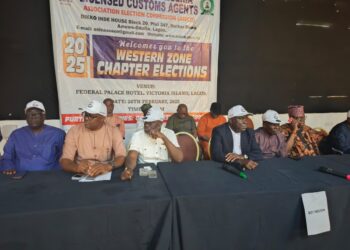
In preparation for the full deployment of the B’Odogwu platform, the Apapa Command of the Nigeria Customs Service (NCS) has organized a comprehensive training session for key industry stakeholders, including freight forwarders and importers.
The initiative follows the pilot phase of the platform at the PTML Command, with the ultimate goal of replacing the existing Web Fontaine system with the Unified Customs Management System (UCMS), otherwise known as B’Odogwu.
The training, which took place at the Apapa Customs Command, was declared open by the representative of the Customs Area Controller (CAC), Babatunde Olomu; Deputy Comptroller of Administration. Henry Eromobor who acknowledged the importance of the training in ensuring a smooth transition to the new system. Olomu, he noted that while change is often met with challenges, proper preparation and training are essential to overcoming these hurdles.
“Of course, we all know that change is good, but we must also anticipate the challenges that come with it. This is why there is a need for thorough training to ensure that stakeholders and officers of the command are well-prepared,” Olomu stated. He further noted that the pilot phase of B’Odogwu commenced on February 15, with training sessions first conducted for officers before extending to stakeholders.
The session was coordinated by Assistant Comptroller of Customs (AC) C.A. Nwahukwu, who explained that the B’Odogwu platform, officially named the Unified Customs Management System (UCMS), is a comprehensive application designed to streamline customs processes.

“When the Deputy Comptroller General of Customs in charge of ICT and Modernization visited last week, she likened the B’Odogwu platform to a tree with various branches. This means it integrates multiple applications, simplifying processes for traders, customs representatives, and all relevant stakeholders,” Nwahukwu explained.
According to her, the UCMS encompasses multiple features that will revolutionize customs operations, including the ability for declarants to process declarations on the platform and for traders to manage their Form M applications without visiting banks. She highlighted that the new system will integrate other stakeholders, such as terminal operators, shipping lines, and bonded warehouse operators, creating a seamless digital customs ecosystem.
She explained that for customs representatives, formerly known as licensed agents under the repealed Customs and Excise Management Act (CEMA), the new system introduces a more structured interface that allows for easy selection by traders. She added that once a trader selects a declarant, all relevant documents, including Form M and Pre-Arrival Assessment Reports (PAAR), will be routed accordingly.
“The new system eliminates unnecessary paperwork and physical movement. Traders will be able to track their declarations in real-time, knowing exactly which officer is handling their case at any given time,” Nwahukwu added.
Speaking also at the training, AC S. Abubakar provided a detailed walkthrough of the platform, demonstrating how stakeholders will be onboarded and how they can efficiently navigate the system. He emphasized that B’Odogwu is designed to be user-friendly, with functionalities similar to the former NICIS II system but with enhanced efficiency.
“The system ensures that all transactions are digitally linked, from customs declarations to terminal operations. Over 20 shipping companies and terminal operators have already been integrated into B’Odogwu, and more will be added before full deployment,” Abubakar said.
Stakeholders present at the training raised questions regarding the new platform’s integration with existing customs procedures, compliance requirements, and potential challenges in adapting to the digital shift. The trainers reassured them that the platform was designed to address past inefficiencies and improve trade facilitation.
Assistant Comptroller AC Fanyam implementation lead of the B’Odogwu platform further reassured that the NCS, through this training, has reaffirmed its commitment to modernizing Nigeria’s custotms operations by leveraging technology.
He said with the B’Odogwu platform the agency aims to enhance transparency, efficiency, and ease of doing business for all players in the trade sector. He urged stakeholders to fully embrace the transition, ensuring a seamless and efficient customs clearance process for the future.















